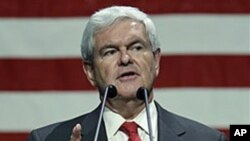The U.S. intervention in Libya as part of an international coalition is drawing fire from several Republicans expected to run for president next year.
Although the 2012 presidential campaign is at an early stage, several potential Republican contenders are speaking out on President Barack Obama’s decision to take part in the international coalition enforcing the "no fly zone" over Libya, established by authority of the United Nations.
The latest critique came from former U.S. House Speaker Newt Gingrich, who was interviewed on NBC’s Today program.
"I would not have intervened," said Gingrich. "I think there were a lot of other ways to affect Gadhafi. I think there are a lot of allies in the region we could have worked with. Having decided to go there, if Gadhafi does not leave power, it will be a defeat for the United States."
Gingrich is expected to make a formal announcement on a presidential bid in the next several weeks.
Another expected entrant into the 2012 race is former Massachusetts Governor Mitt Romney. Romney offered a broader critique of the president in an interview earlier in the week with conservative radio talk show host Hugh Hewitt.
"Thus far the president has been unable to construct a foreign policy, any foreign policy," said Romney. "He is tentative, indecisive, timid and nuanced."
Former Alaska Governor Sarah Palin was also asked about the Obama administration’s deliberations on Libya during a recent visit to India.
"Less dithering, more decisiveness," said Palin.
Palin is believed to be considering a White House run next year, though many political analysts say they are unsure if she will join the Republican field of candidates for 2012.
President Obama defended U.S. involvement in the Libyan operation during his visit to El Salvador and said it was part of a broader goal of supporting non violent change in the region.
"And when we can have some impact on that with a relatively modest contribution as part of a broader international effort, then I absolutely believe that the costs are outweighed by the benefits," said President Obama.
Until now, the early jockeying in the 2012 race for the Republican presidential nomination has been dominated by domestic issues, especially the economy, jobs and the soaring U.S. budget deficit. But there are signs that a fresh debate may emerge among the 2012 contenders over the war in Afghanistan.
Mississippi Governor Haley Barbour made news during a recent trip to Iowa when he questioned the U.S. mission in Afghanistan and suggested it was time for the United States to withdraw significant numbers of troops. The Obama administration plans to begin the withdrawal of forces from Afghanistan later this year, depending on security conditions on the ground.
A recent public-opinion poll found that nearly two-thirds of those asked no longer believe the Afghan war is worth the cost.
University of Virginia expert Larry Sabato says the Afghan war could become an issue in the Republican caucus and primary voting next year.
"But I have noticed other conservative Republicans like Governor Haley Barbour of Mississippi, who may well be running for president, is starting to express doubts about Afghanistan," said Sabato. "So we do not know how this is going to play out, but I think if the public continues to be disaffected with the war, then it is going to find a way to work itself into the election campaign."
Historically, foreign policy issues have proven to be less important during a presidential election that the state of the domestic economy.
But there have been exceptions to that rule.
Political analyst Rhodes Cook says the last time foreign policy was a decisive issue in a U.S. presidential election campaign was in 1980 when President Jimmy Carter lost his bid for re-election in part because of the Iranian hostage crisis that began late in 1979 and dragged on through the election year.
Cook says U.S. voters do pay attention to how their president handles a foreign policy crisis.
"I think ultimately it comes down to a situation when you are running for re-election, do you look like you are controlling events, or does it look like events are controlling you," asked Cook.
While foreign policy issues are getting some attention at the moment, most experts believe President Obama’s re-election fate will be decided by how voters perceive the state of the U.S. economy.
Among them is Larry Sabato:
"As long as the economy continues to improve, so will President Obama’s prospects for re-election," he said. "In the end, voters do not ask why the economy is good or bad, they simply give credit or blame to the incumbent president."
Former Minnesota Governor Tim Pawlenty was the first major Republican to take a step toward running when he set up an exploratory committee this week. Several contenders are expected to follow suit in the weeks ahead.
Republican Presidential Hopefuls Take On Obama Over Libya
- By Jim Malone





